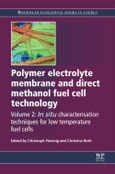Polymer electrolyte membrane fuel cells (PEMFCs) and direct methanol fuel cells (DMFCs) technology are promising forms of low-temperature electrochemical power conversion technologies that operate on hydrogen and methanol respectively. Featuring high electrical efficiency and low operational emissions, they have attracted intense worldwide commercialization research and development efforts. These R&D efforts include a major drive towards improving materials performance, fuel cell operation and durability. In situ characterization is essential to improving performance and extending operational lifetime through providing information necessary to understand how fuel cell materials perform under operational loads.
This two volume set reviews the fundamentals, performance, and in situ characterization of PEMFCs and DMFCs. Volume 1 covers the fundamental science and engineering of these low temperature fuel cells, focusing on understanding and improving performance and operation. Part one reviews systems fundamentals, ranging from fuels and fuel processing, to the development of membrane and catalyst materials and technology, and gas diffusion media and flowfields, as well as life cycle aspects and modelling approaches. Part two details performance issues relevant to fuel cell operation and durability, such as catalyst ageing, materials degradation and durability testing, and goes on to review advanced transport simulation approaches, degradation modelling and experimental monitoring techniques.
With its international team of expert contributors, Polymer electrolyte membrane and direct methanol fuel cell technology Volumes 1 & 2 is an invaluable reference for low temperature fuel cell designers and manufacturers, as well as materials science and electrochemistry researchers and academics.
Please Note: This is an On Demand product, delivery may take up to 11 working days after payment has been received.
Table of Contents
Contributor contact details
Woodhead Publishing Series in Energy
Preface
Part I: Fundamentals of polymer electrolyte membrane and direct methanol fuel cell technology
Chapter 1: Fuels and fuel processing for low temperature fuel cells
Abstract:
1.1 Introduction
1.2 Thermodynamics of fuel cell operation and the effect of fuel on performance
1.3 Hydrogen
1.4 Hydrocarbon fuels and fuel processing
1.5 Methanol
1.6 Other sources of hydrogen
1.7 Deleterious effects of fuels on fuel cell performance
1.8 Conclusions
1.9 Acknowledgements
Chapter 2: Membrane materials and technology for low temperature fuel cells
Abstract:
2.1 Introduction
2.2 Perfluorosulfonic acid membranes
2.3 Morphology and microstructure of ionomer membranes
2.4 Non-perfluorinated membranes
Chapter 3: Catalyst and membrane technology for low temperature fuel cells
Abstract:
3.1 Introduction
3.2 Catalysts for polymer electrolyte membrane fuel cells (PEMFCs)
3.3 Catalysts for direct methanol fuel cells (DMFCs)
Chapter 4: Gas diffusion media, flowfields and system aspects in low temperature fuel cells
Abstract:
4.1 Introduction
4.2 Gas diffusion media
4.3 Flow field design
4.4 System layout
4.5 Direct methanol fuel cell (DMFC) system architecture
4.6 Conclusions
Chapter 5: Recycling and life cycle assessment of fuel cell materials
Abstract:
5.1 Introduction
5.2 Environmental aspects of fuel cells
5.3 Fuel cell hardware recycling
5.4 Life cycle assessment of fuel cell fuels and materials
5.5 Future trends
5.6 Sources of further information and advice
Part II: Performance issues in polymer electrolyte membrane and direct methanol fuel cells
Chapter 6: Operation and durability of low temperature fuel cells
Abstract:
6.1 Introduction
6.2 Thermal management
6.3 Water management
6.4 Reactant flow management
6.5 Contamination
6.6 Duty cycle impacts on durability
6.7 Implementation of approaches to extend lifetime
6.8 Future trends
6.9 Sources of further information
6.10 Acknowledgements
Chapter 7: Catalyst ageing and degradation in polymer electrolyte membrane fuel cells
Abstract:
7.1 Introduction
7.2 Catalyst ageing mechanism
7.3 Characterization of catalyst degradation
7.4 Identical-location transmission electron microscopy
7.5 Future trends
Chapter 8: Degradation and durability testing of low temperature fuel cell components
Abstract:
8.1 Introduction
8.2 Chemical degradation of the proton exchange membrane (PEM)
8.3 Pt dissolution
8.4 Carbon support corrosion
8.5 Contamination sources
8.6 Conclusions
Chapter 9: Microstructure reconstruction and transport simulation in polymer electrolyte membrane fuel cells
Abstract:
9.1 Introduction
9.2 Microstructure reconstruction
9.3 Analysis of transport characteristics
9.4 Conclusions
9.5 Acknowledgements
Chapter 10: Multi-scale modeling of two-phase transport in polymer electrolyte membrane fuel cells
Abstract:
10.1 Introduction
10.2 Pore network modeling
10.3 Lattice Boltzmann modeling
10.4 Macroscopic upscaling
10.5 Conclusions
10.6 Acknowledgement
Chapter 11: Modelling and analysis of degradation phenomena in polymer electrolyte membrane fuel cells
Abstract:
11.1 Introduction
11.2 Aging mechanisms of polymer electrolyte membrane fuel cell (PEMFC) materials and performance decay: why physical modelling?
11.3 Towards a multi-scale modelling framework for PEMFC degradation analysis
11.4 Conclusions, perspectives and challenges
Chapter 12: Experimental monitoring techniques for polymer electrolyte membrane fuel cells
Abstract:
12.1 Introduction
12.2 Reasons for monitoring fuel cells
12.3 Experimental monitoring techniques
12.4 Application example: detection of liquid water in fuel cells by conductimetric technique
12.5 Recent trends and conclusions
Index








